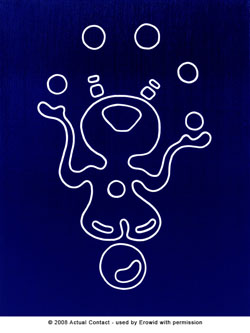Impulse
“It is my belief that the desire to alter consciousness periodically is an innate, normal drive analogous to hunger or the sexual drive. … [T]he need for periods of nonordinary consciousness begins to be expressed at ages far too young for it to have much to do with social conditioning. … Three- and four-year-olds, for example, commonly whirl themselves into vertiginous stupors. They hyperventilate and have other children squeeze them around the chest until they faint. They also choke each other to produce loss of consciousness.”
— Andrew Weil, MD, The Natural Mind (1972)
I’m not particularly interested in drugs. I mean, drugs are cool and all, and I’m told their actions are really fascinating from a biochemical standpoint. Their history certainly is colorful and illuminating; and sure, the social issues surrounding drugs and drug policy are important and thought-provoking. When it comes right down to it, though, psychoactive drugs are just a means to an end for me. If a machine came along that safely and reliably produced a programmable range of similar effects, I’d be an instant convert.

What I’m really interested in is exploring my own mind. I once played a first-person style video game for months before I discovered that there was another setting that allowed me to view the map and action from above. I started kicking ass immediately and I couldn’t believe how long I’d managed to somehow get by without ever discovering this important and useful feature. Similarly, I like to tweak my own settings now and then, just to try to figure out what the heck my mind is and to discover what’s possible to do with it. It’s perfectly natural to want to play with ourselves, and the mind is our most entertaining toy. Or at least it’s a contender.
In my case, the impulse to alter consciousness seems to be hardwired. I can’t remember not being aware of it, and my memory goes way back. As a child I made myself dizzy a lot. I rolled myself up in an electric blanket and gave myself fever dreams and played those slumber party pass-out games that end up killing a few kids every year.1 I remember being given NyQuil when I was sick in grade school, and slipping back into the bathroom to sneak a second dose so that I could pretend that I had been drugged by the commies and was putting up a brave, desperate struggle against the inevitable oblivion, determined to resist the spell under which I would be persuaded to spill the big beans. I loved to be tickled, spun, and turned upside down.
The same drive that had me smoking catnip and banana peels in junior high compelled me to ride roller coasters and run cross country. The nutmeg on the spice rack and the datura growing wild in my neighbor’s backyard held the same appeal for me as watching horror movies and riding my dirt bike down a flight of stairs. It’s not that I wanted to be frightened as such, and I certainly didn’t want to get hurt. I just wanted to get high, to feel that exquisite sense of being alive that comes with a sudden and novel shift in chemistry and perspective.
What is it that motivates otherwise sane people to jump out of perfectly good airplanes? The same thing that impels folks to ski off of cliffs, race fast cars, and run with the bulls. It’s the rush, dude! Ask them. They’ll tell you. Yoga, breathwork, tantric practices, flow arts, meditation, lucid dreaming, chanting, dance, fear, pain, exercise–all that good stuff will totally get you off if you do it right.
Yeah, yeah, I know: in the “spiritual” disciplines this is not supposed to be the point, and pursuing a practice for the sensation or gratification (to say nothing of hypothetical super powers) is derided as just a tunnel back into the trap. When I’ve asked why they make the effort, though, most ascetic practitioners have claimed that their practice fills them with a profound sense of peace and harmony. Isn’t that an altered state, too?
One could argue that we seek love largely for the rush. That’s partly why so many relationships break up as soon as the candy coating gets licked off. We talk about it in terms of how it makes us feel. We say, “I love so-and-so because s/he makes me feel all giddy, like I’m floating on air!” Part of what’s happening there is, of course, a chemical reaction. We’re starting to get a fix on the hormones, pheromones, and neurotransmitters involved, and some progress has been made towards chemically reproducing those states or their near relatives. For sure many of us pursue sex just to get off, and we often construct elaborate scenarios to intensify the effect. Reproduction might be the impetus at the genetic level, but at the decision-making level we do it because it feels good. It brings up aspects of our psyches that are normally dormant and allows us to experience our own nature from an alternative point of view.
On the other side of the scale, some people kill for the thrill. The clarity that can arise in moments of mortal danger, the sudden onslaught of fight-or-flight chemicals, and the vertiginous sense of combined freedom and alienation that accompanies a breach of collective values is said to be a heady combination. Some people are hooked on hurting themselves. Others pick fights with their loved ones because they’re unconsciously addicted to the anger high, or the stuff that gets released into their system when they cry.
A case can be made that damned near everything we do is undertaken in order to alter and enhance our consciousness. Why do we like to travel and engage in novel experiences? Why do we dance or sing or play music? Why do we work to help the disadvantaged? We do it because of the way it makes us feel. When we engage in behaviors that are rewarded by our neural programming, we feel (variously) clear, focused, calm, proud, loving, excited, empathically connected, turned on, and in sync with the universe. We now know that most of these feelings have a chemical origin–or anyway we know that chemistry plays a part in their expression. The innate desire to tune in to these altered states is one of the driving forces behind human evolution. From nursing a baby to building a rocket ship, we act in order to change how we feel, and in so doing we change the world around us.

Those who play at the edge of what’s possible, who pursue novelty, are the ones who push the envelope of consciousness evolution. Nature selects for the drive to defy boundaries and to look at things from different angles as surely as it selects for a safe and conservative approach, because, although the cautious route is often the best bet, the potential pay-off of a groundbreaking win can be so damned compelling. We know this impulse has been successful because it persists in human hearts to this day, tempered (perhaps) with a healthy dose of ingrained prudence.
It makes me happy when I see little kids rolling down a hill or hanging by their knees at the park. It fills me with hope for the future, because today’s kids are going to have to learn to adapt to change more quickly than any generation that has come before. Theirs will be a world that’s ever in motion, and I imagine that neophiles will have a distinct advantage. For my nephew’s third birthday I got him a Sit’n Spin, which is one of those toys designed to make the rider dizzy. He was very pleased, as I knew he would be. On the underside, in black Sharpie pen, I inscribed a quote attributed to Timothy Leary: “Anything that disorients you is good.”
References
1. Centers for Disease Control and Prevention. “Unintentional Strangulation Deaths from the ‘Choking Game’ Among Youths Aged 6-19 Years — United States, 1995-2007”. Morbidity and Mortality Weekly Report. Feb 15, 2008;57(06):141-4.



I always enjoy your thoughts, but last month, you not caring to deal with the complication of beliving your own senses concerning entities (because drugged contact experiences are somehow contained IN the substances& therefore not real . . . somehow) & now this month, not wanting to deal with drugs ! Really ! Well, check out the state of the art (or as close as ‘free’ gets to it) in brainwave entrainment: http://iso-tones.com 50 or so mind altering mp3 files. Please keep writing, but keep in mind – as much as you think you know now – wisdom comes in the realization of how little it really is – & what we think now will soon just be what some USED to belive. ;P eace (ntl)
Comment by Cee Are — February 1, 2010 @ 1:39 pm
Nice article… However… Huffing gas is disorienting! NOT GOOD! I see what you’re getting at, but… Not sure if that’s really a good thing to tell a little kid. I could definitely name off a list of disorienting things that are no good at all, probably starting with head trauma, right? I totally agree that attaining altered states gratifies a base drive, though.
Comment by Bark — February 3, 2010 @ 3:14 am
Ahhh…the Sit’n Spin…..such a classic
A nice episode of Teatime, thanks!
Comment by Fallout330 — February 4, 2010 @ 7:56 am
Thank you for this article. It has given me a lot to think about.
Comment by yellowarcher — February 4, 2010 @ 11:52 am
Love the piece. Brought me back to all the stuff I did as a kid. I remember spinning on the tire to a terrible sickening point for reasons I couldn’t explain, holding myself up on the fire poles for as long as I could, holding my breath and making my face red, becoming delusional after heat strokes, etc. Love Leary’s quotation. Great present!
Comment by conor brown — February 4, 2010 @ 9:29 pm
not sure i could click into this one as well as the other ones, didn’t quite feel right. but, i appreciate your words nonetheless.
Comment by bing bopper — February 5, 2010 @ 12:28 am
Wow, I have to say this article blew me away. This really hit home in my heart and I definitely understand the context. No, huffing dangerous chemicals and inflicting self harm aren’t positive ways to view reality from a different perspective, but the underlying drive to experience a shift in our reality is universal, and thats what’s being explained here. I am very fond of the quote “If a machine came along that safely and reliably produced a programmable range of similar effects, I’d be an instant convert.” Many people who use dangerous chemicals or become addicted to substances that can ruin your life would love this. Who wouldn’t mind the rush of cocaine without the addictive nature or harmful side effects? This article is very well explained and I’m glad to have stumbled upon it. :)
Comment by Michael — February 6, 2010 @ 12:45 pm
Keep these coming, I look forward to it each month.
Comment by egor — February 7, 2010 @ 8:45 pm
I resonate with your thoughts and thought I’d recommend a couple books to you on the subject of this innate drive to get fkd up!
Intoxication: The Universal Drive for Mind-Altering Substances
Ronald K. Siegel Ph.D. (Author)
Also
Animals and Psychedelics: The Natural World and the Instinct to Alter Consciousness
Giorgio Samorini (Author), Rob Montgomery (Foreword), Robert Montgomery (Author)
Which is partly based on Siegel’s work.
Comment by Noah — February 9, 2010 @ 2:25 pm
The point about “everything being undertaken to enhance consciousness” made me think of the concept of Flow developed by Mihaly Csikszentmihalyi. Flow is when you are in a situation that matches high ability with high challenge, which is characterized by a feeling of great absorption, engagement, fulfillment, and skill—and during which temporal concerns (time, food, ego-self, etc.) are typically ignored. Basically, a very altered state, immensely enjoyable and productive.
Anyways, Csikszentmihalyi proposes in one of his books that the state of flow is one of the main things that propels the development of our culture and sciences, that people desire this state which is found in working on immensely difficult (And immensely interesting) projects and problems. So basically, artists, scientists, philosophers, etc. are not engaging in the activities for some external end (i.e. the development of the culture), but find the problems stimulating and rewarding in and of themselves.
His stuff is really fascinating and intuitive, and what you said really resonated with what I’ve been reading about flow.
Interesting post. I would be hesitant to reduce too much towards chemistry though. An experience with MDMA taught me that things aren’t that simple: while clearly feeling the effects and the chemical joy and happiness, my inner perspective was incredibly negative, and almost ruined the experience. Perspective is essential, and I don’t think we know enough to say consciousness= chemistry (not your words, but I’m just taking their superlative). I do acknowledge that chemistry is an essential part of consciousness though.
Comment by PJ — February 24, 2010 @ 9:38 pm
i used to have a sit’ n spin when i was little. it was a lot of fun! that was a great article and the second to last paragraph was my favorite! :) i like reading your column and thinking about the ideas in it. sometimes the way you write stuff makes me laugh for a long time. the teafarie column has been a big inspiration for my writing! i always look forward to a new column and sometimes read the same ones over again and find new ideas that i didn’t notice the first time! thanks! :)
..i think the two funniest parts of this article was the visual of you about to ride a dirtbike down the stairs(sorry if you got hurt in the end)..and this quote,, “He was very pleased, as I knew he would be.”..:)
Comment by eyorca — September 26, 2010 @ 7:54 am